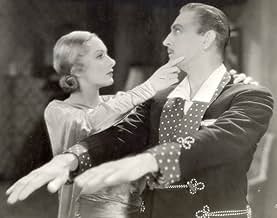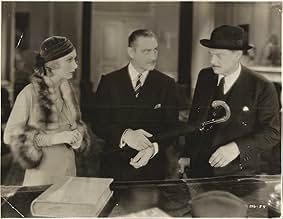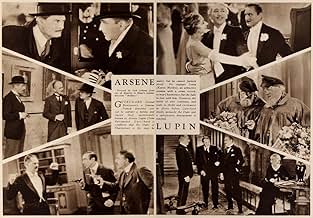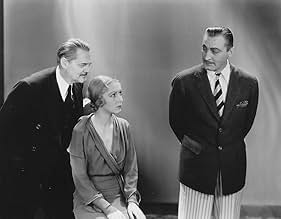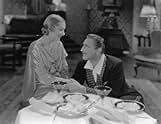Füge eine Handlung in deiner Sprache hinzuA detective is tasked to capture an elusive thief called Arsene Lupin.A detective is tasked to capture an elusive thief called Arsene Lupin.A detective is tasked to capture an elusive thief called Arsene Lupin.
- Auszeichnungen
- 3 wins total
- Laurent
- (as James Mack)
- Louvre Tour Guide
- (Nicht genannt)
- Party Guest
- (Nicht genannt)
- Louvre Guard
- (Nicht genannt)
- Party Guest
- (Nicht genannt)
- Gendarme
- (Nicht genannt)
- Mother at the Louvre
- (Nicht genannt)
- Party Guest
- (Nicht genannt)
- Detective
- (Nicht genannt)
Empfohlene Bewertungen
*** (out of 4)
When John Barrymore got out of his contract with Warner, MGM wasted no time in signing him and even lesser time in putting him in a film with his brother Lionel. This was the first of five films they'd make together and their easy to spot rivalry really makes this film the charming gem that it is. An elderly detective (Lionel) is convinced that the Duke of Charmerace (John) is the infamous jewel thief known as Arsene Lupin. The detective will stop at nothing to prove his thoughts and that includes bringing in a sexy spy (Karen Morley). The story itself isn't anything ground breaking or Oscar-worthy but it is good enough to build up two nice characters and then stand back and let the actors do all the work. Fans of the brothers will certainly get a kick out of seeing the two men working together as both deliver very strong performances and they really make this film worth seeking out. What works best is the comic timing that the two men bring to the table as well as their rivalry. Each scene that the two men are in you can tell that they are trying to out act the other and this adds a charm that no two other actors could have captured. Just take a look at the sequence at the start when Lionel arrests John thinking that he's lying about being the Duke. Just watch this scene and then compare it to a later scene where John is holding Lionel captive until he can prove that he's really a cop. Morley also fits into the threesome quite well as she has an undeniable sexual tension with John and some fun comic touches with Lionel. The scene where she introduces herself to the Duke while naked in his bed is a pre-code gem. Some could argue that a stronger "story" would have helped matters and it might have but the cast doesn't even bother to speak with French accents so there's no doubt that the studio was just trying to get the two men in the same film. The ending packs a terrific punch as everything gets closed up very tightly and in a way that everyone, including the viewer, wins.
KAREN MORLEY is the attractive blonde who is supposed to be helping Lionel get the goods on the thief--but, unfortunately, she's no help at all when she falls hopelessly in love with the charming scoundrel.
So much about the film, where much of the action takes place on a country estate with wealthy people in attendance, reminds me of the David Niven/Olivia de Havilland film about the Scotland Yard thief RAFFLES. Barrymore plays the role with the same effortless charm that Niven adapted for his Raffles, the man who kept authorities baffled with a string of jewel robberies.
TCM is showing a good print of the film and while some of the dialog leaves a lot to be desired, it's a good example of an early sound film that still holds up today. Interior sets of the country estate are expensively mounted and it's obvious this was designed as a major film, not a programmer, despite the slight story.
Lionel hams it up considerably throughout, but John is more effective in his underplayed role.
Including 1932's 'Arsene Lupin'. If anybody loves or at least appreciates John and Lionel Barrymore individually they should find much to enjoy, and even more so seeing them together. If anybody loves the character of Lupin, they should find a lot to like about 'Arsene Lupin' (am not saying that for definite and it is not going to be the case for all perhaps). It serves as a very introduction to him if one has little prior knowledge of Lupin and is intrigued by it for appreciating early talkies and the Barrymore brothers. As far as early talkies go, 'Arsene Lupin' is not one of the best but it is not one of the worst either (nowhere near close, personally put it somewhere around high middle).
What really makes 'Arsene Lupin' so worth watching is the Barrymore brothers. Generally have a personal preference for Lionel ever since seeing his unforgettable Potter from 'It's a Wonderful Life' for the first time, and he is clearly having enormous fun here so it was easy to enjoy him. To me though John as Lupin comes off even better, suave, amusing and charming all at once and he is also a lot less theatrical here than he was prone to around this period. Their chemistry is dynamite. Karen Morley more than holds her own and is endearing, love her alluring chemistry with John and she even gets some risque material. Tully Marshall stands out too with great comic timing without being too buffoonish. The whole cast is good.
Likewise with the adroit direction from dependable Jack Conway, have not liked every film of his but he did do some very good ones and 'Arsene Lupin' is one of them. He never seemed ill at ease with the material or at odds with it. The film looks attractive and full of class, especially the photography, and the score has a sense of adventure and tension orchestrated beautifully. There is some nice witty dialogue throughout, it never gets vulgar and the sophistication shines. The story is always involving and has an authentic atmosphere, the ending is thrilling.
Really not much here to criticise, though there are times where the relative infancy of early talkies is betrayed in some staid pacing every now and again, bogged down by not always necessary caption cards, and padding.
Overall, very entertaining. 8/10
Karen Morley did a filmed interview in 1992. You can find it on-line. Toward the end, the interviewer asked which of her films she liked doing the most. She was in some good ones, before her independent spirit got in her way and she broke her MGM contract: "Scarface:' "Mata Hari:' "Dinner at Eight;" "Black Fury;" "Our Daily Bread;" "Gabriel Over the White House;" later "Pride and Prejudice." I expected her to say "Scarface." She said "Arsene Lupin" because it was fun. She and Jack Barrymore, she said, had fun. You can see it on screen. They're all having fun. (Tully Marshall looks like he wants to laugh half the time.) The sleep-walking scene is hilarious. And the scene where she's naked in Barrymore's bed. A gem. Karen Morley had an unusual style, understated. She makes you want to get inside her head, since she won't make her emotions obvious on the surface. It is sometimes disconcerting. But it makes you watch her closely. She also said, perhaps jokingly, in the interview, "I wasn't very good, I think, (in that movie) but it was fun." I thought she was very good, and smart. You can't out-act John Barrymore when he wants to ham it up. So smile (she had a wonderful smile) and let him do his thing. Both Barrymores do their thing. They catch the spirit of Maurice LeBlanc's outrageous characters marvelously. My recommendation: have a beer or two, or a glass of Bordeaux, then settle in to watch this film. You'll have a perfect evening's entertainment.
I wonder if Arsene Lupin was the inspiration for the infamous Savoir-Faire from the Klondike Kat cartoon. For those who don't know, Savoir-Faire was a French-Canadian mouse who also happened to be a master thief. Probably not but I love imagining Lionel Barrymore saying "Savoir-Faire is everywhere."
Wusstest du schon
- WissenswertesThe selling point at the time of the film's release was the first joint screen appearance of brothers John and Lionel Barrymore. Their chemistry was so strong that they would be co-assigned four more times by MGM in the next two years, in Menschen im Hotel (1932), Der Dämon Rußlands - Rasputin (1932), Auf Leben und Tod (1933), and Dinner um acht (1933), the last of which gave them no scenes together. Rasputin and the Empress (1932) marked the only time that all three Barrymore siblings - Lionel, Ethel and John - appeared in the same film.
- PatzerLupin steals the Mona Lisa by wrapping the canvas around his umbrella. The Mona Lisa is painted on a wood panel.
- Zitate
Arsène Lupin: [fetching Sonia's evening gown from the maid and holding it up to admire it] Well, here we are. It's very nice! It's a little naughty. It's very ni - Do you think your father the general would approve of this?
Sonia: My father the general always said that a gentleman was a man who never went to bed with his spurs on.
Arsène Lupin: Isn't that a pity. I'm so fond of horses. I could give up riding...?
Sonia: Give me that dress!
Arsène Lupin: You can't get into it alone
Sonia: The maid will help me.
Arsène Lupin: The maid? I know more about unhooking than any maid in Paris.
Sonia: Yes, but I want this one hooked.
[she reaches for the dress, which he holds out of reach]
Sonia: I'm going to stay right here in this bed until you leave this room!
[Chamerace walks over to the window and prepares to toss out the dress]
Sonia: What are you doing?
Arsène Lupin: Well, if you're going to stay in bed you won't need the dress.
- Crazy CreditsThe opening title doesn't list the Barrymores separately, but instead as a pair, "John and Lionel Barrymore."
- VerbindungenFeatured in Biography: The Barrymores (2002)
Top-Auswahl
Details
Box Office
- Budget
- 433.000 $ (geschätzt)
- Laufzeit
- 1 Std. 24 Min.(84 min)
- Farbe
- Seitenverhältnis
- 1.37 : 1



